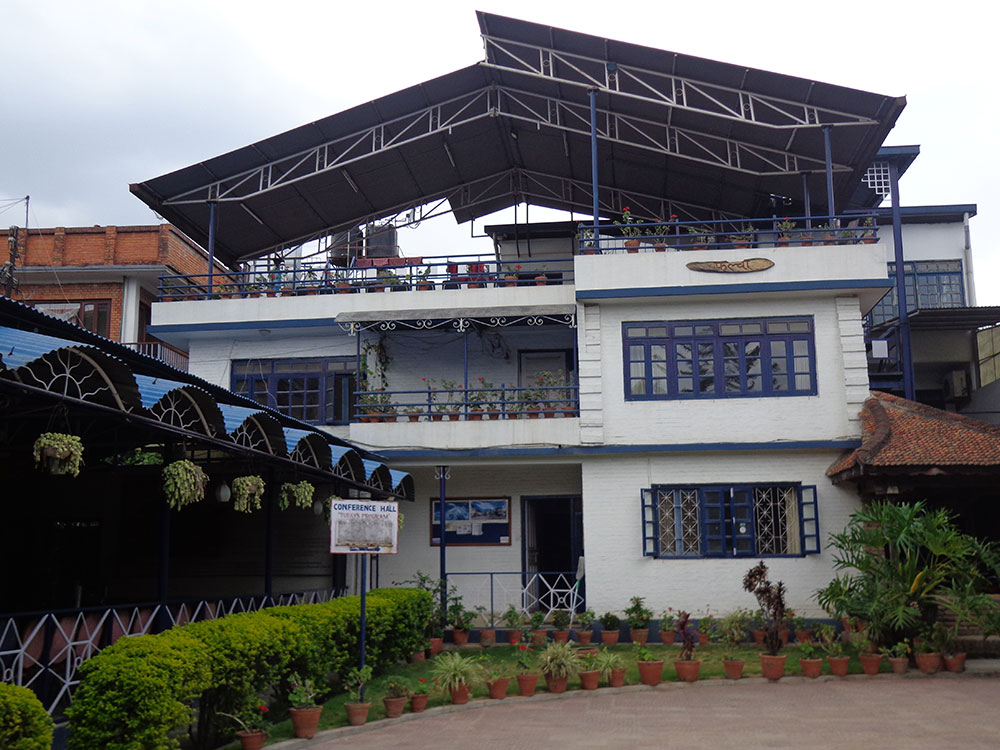About Us

SAP Nepal, a non-government development organization, is currently active in the development arena for promotion of good governance at different level . Since 1985 it has been advocating the overall social, political and economic issues for enhancement of the lives of the Nepalese people. With its extensive partnership with over 1,600 organizations in 65 districts, SAP-Nepal has placed itself in a meaningful position to help strategically direct the evolution of the community-based organizations that are best equipped to bring about pro poor, bottom-up development in Nepal. SAP-Nepal started its development journey as a fund-channeling mechanism in 1985, later transforming itself into a facilitating organization in 1989. One of the first steps in this direction was the incorporation of human resource development through capacity building initiatives of Nepali NGOs. Working with grass roots community members has given SAP-Nepal a capacity to work more intensively as a national organization to facilitate a participatory sustainable development process. The diversity in the country’s socio-cultural traditions, socio-economic and socio-political practices; and physical features has forced SAP-Nepal to be more sensitive in dealing with development and to consciously adopt people-based approaches.
Evolution process of SAP Nepal
Through voluntary organizations in different guises existed well before the 20th century, NGOs as they are recognized today have a more recent history. For example, Guthi system was already established firmly in Nepal. Slowly but surely, Nepal saw the arrival of social as well as Welfare and Charity Organizations. In such a scenario, South Asia Partnership – Nepal was established as an INGO in 1985 in affiliation with the then Social Service National Coordination Council (SSNCC).Those were days when everything was different. SSNCC, as the only governing body had a tight hold over the NGOs thereby restricting their development work. In the initial few years of its establishment SAP-Nepal provided funding support to grass-roots NGOs to implement welfare nature of projects. To address the changing need of the NGO sector SAP-Nepal initiated the Human Resource Development Program (HRDP) in 1989 to give needed training to development workers. Later it was realized that problems confronted by the rural populace of Nepal are multi-dimensional in nature that needs integrated approach to solve it. Community Action Program (CAP), a multi-sectoral and community based integrated development project of SAP Nepal was based on this thinking which was initiated in 1990.
Then came 1991 and democracy. The year was not only a milestone in the political arena, but also in the field of development. SSNCC became SWC (Social Welfare Council) with liberal policies and a broader vision. NGOs got a change to be their own bosses. From 300 registered NGOs in 1990, the number of NGOs registered with SWC has jumped to 2100 in 1994. This alone can give a picture of how things have changed. In such a situation, SAP- Nepal got a chance to really flourish and work harder towards its goal of building a better society before the situation got totally out of control in terms of high dependency of external funding agencies on NGOs and lack of capacity of Nepali NGOs to take up growing responsibilities. SAP Nepal ventured into another area by starting the Long Term Partnership Program (LTPP).
SAP- Nepal diversified its programs through LTPP with a life span of five years to build up people’s institutions at the local level. The main aim of LTPP was to support and strengthen the institutional capacity of local voluntary organizations by promoting institutionalization and self- reliance through participatory process of development which responds to the expressed needs of disadvantaged community.
In 1994 there was one more dimension in the SAP- Nepal evolution process. SAP-Nepal initiated NGO Resource Center or PATH project (Participatory Action Towards Holistic Development) in collaboration with SNV Nepal. It was turning point for SAP-Nepal to change its paradigm from need-based to right based approach. From 1994 onward SAP-Nepal has been actively involved in peace building, good governance and social accountability promotion intervention at different levels.
Core Values
SAP-N is a value based organization and gives due value to the capacities of people for their innovative characteristics in developing culture of adaptations. It also understands the deeper gap in the capacities of the people due to social, natural and other phenomena. The major values thus adopting by the organization are as follows:
- People have innate potentials for change
- Socio-economic transformation can be achieved through people based development
- Adoption of inclusive approaches leads to social justice
- The Civil Society is an effective actor for promoting governance, democracy, human rights and accountability at all levels
Approaches
Partnership: Working in partnership with various national and international organizations that is characterized by transparency, accountability and equality between and among partners
People Centered: People- centered development represents a shift from the service delivery option to strengthening the capacity of local people themselves to manage their own concerns and influencing their environment
Gender Sensitive: It is considered as one of the cross cutting issues in every development programs to promote equitable development.
Sustainability: Sustainability is considered as continuity with growth of development process even after phase over of the project supported by external organization
Non Partisan: Civil society organizations in general should remain above any party politics for effective and efficient development facilitation.
Action
- Policy Research and Advocacy
SAP-Nepal applies its best efforts to policy analysis and research in order to find out its relevancy and the status of implementation for effective knowledge sharing and advocacy. It facilitate advocacy campaigns to influence policies at different levels ranging from the village to the district, regional, national, and South Asian levels.
- Linkage and Networking
Social, economic or political governance are the major strategic focus of SAP-Nepal to extend linkage and networking. The process promote linkages and networking to institutions from the village, district, regional, national and international forums.
- Capacity Building
SAP-Nepal looks at capacity building as a whole range of ideas, approaches, and development interventions. With an increase in the role of civil societies in the promotion of the rights and entitlements of citizens, influencing government policies and filling gaps in services, attempts are made to increase their activities at the policy level. It involves strengthening of the people’s understanding of their own needs and their right to participate in governance.
- Knowledge Management
Knowledge management includes the process of identifying intellectual assets within organizations. SAP-Nepal understands sustainability as continuity with growth, adopting the principles of social justice, economic viability and environmental friendliness. It focuses on a three-pronged sustainability approach namely, organizational sustainability, development process sustainability and financial sustainability.
Strategies
Based on the knowledge and infrastructures it has developed in the last 29 years, SAP-N adopt the following strategies:
1. To promote forums of civil societies for organizing and networking Disadvantaged Groups (DAGs) so that they can raise their voices for human development and pro poor policy influencing to deal with governance issues
2. To facilitate consultative processes on positive discriminatory processes for human development and human rights
3. To facilitate resource generation processes by promoting an enterprise development mechanism to enhance technical backup support for the poor
4. To facilitate capacity building interventions for accessing economic opportunities for the poor
5. To enhance the system/mechanism of analyzing the status of policies and practices relating to conflict transformation, peace reconciliation, accountability and protection/enhancement of human rights
6. To influence agencies to adopt an inclusive governance framework
7. To adopt and promote social accountability tools for good governance promotion at different levels
Achievements
These are few achievements in a nutshell:
– Capital generation at local level for the promotion of local enterprises
– Increased women and young leadership at program and institutional level
– Initiation of self help community development programs
– Effective advocacy initiatives by the partners at local level
– Strong linkages established among the civil society
– Increased practices of social accountability at different level
Learning
– Different actors can play various roles in different stages of programmatic and organizational growth. Synergized efforts of the agencies contribute in creating enabling environment for peace reconciliation in post conflict phase.
– Introducing more economic empowerment programs based on needs of the community helps to create congenial environment for smooth political and social transformation process to create new prosperous/ inclusive Nepal.
– The past experiences need to be capitalized and documented to develop/design and implement demand driven programs for the empowerment of poor and marginalized communities.
– More intensive capacity building and knowledge sharing interventions helps to strengthen people’s understanding of their own needs and their right to participate in governance.
VISION
Just Society with Peace and Prosperity
SAP-Nepal has a vision of creating a Just Society with Peace and Prosperity. SAP-Nepal envisages a society where people have wider participation in decision making so that they may control their own lives and the future of their communities. It will be a society, which guarantees equity in opportunity to secure basic human needs and the security of person and property, and finally the sovereignty of the people. Freedom, recognition of human rights, nonviolent action, social accountability and democratization of authority will be the other facets of the envisaged social capital.
MISSIONS
The acquisition of professional competencies from decades of learning in certain areas and sectors has given SAP-Nepal an inspiration to deal with the issues by specializing and strengthening area/sector based units through the following three missions:
- Promotion of potentialities of disadvantaged groups for their development so that they can lead dignified lives in a society that has forgotten the importance of human values, by providing space for sharing and learning experiences among the civil society
- Promotion of equitable access to resources and economic opportunities to the poor, creating an enabling environment whereby they can become competent to change their livelihoods by productively utilizing all their potential resources
- Promotion of pro-people governance at the local and national levels by strengthening and creating solidarity in the civil society to advocate pro people inclusionary policies and practices for social justice and human rights
GOALS/ Objectives
Analyzing the current situation and need of the country at different levels, SAP-N has envisioned the following goals for the achievement of the missions stated:
1.1 Empowerment of disadvantaged groups (women, Dalits, ethnic communities and Madhesis) to enhance their human development potentialities by improving the status of health, education, knowledge/skill and participation in development programs.
1.2 Creation of a congenial environment for the promotion of human development and human rights encouraging disadvantaged groups to improve their living standards by reforming public policies, improving service delivery systems and increasing inclusionary practices.
2.1 Promotion of access to economic opportunities for the poor, enhancing their capacities to promote local resource based economic activities.
2.2 Enhancement of productive utilization of resources by the poor by encouraging them to improve their life style through the utilization of unused and scattered local resources.
3.1 Enhancement of Conflict Transformation Practices by improving the understanding of the people on the causes and consequences of conflict and insecurity and the enhancement of knowledge, skill, attitudes and behavior to direct conflict towards a constructive approach and the promotion of sustainable peace and human rights.
3.2 Promotion of an Accountable System in Governance by designing an appropriate participatory framework for advocacy and practicing social accountability tools

